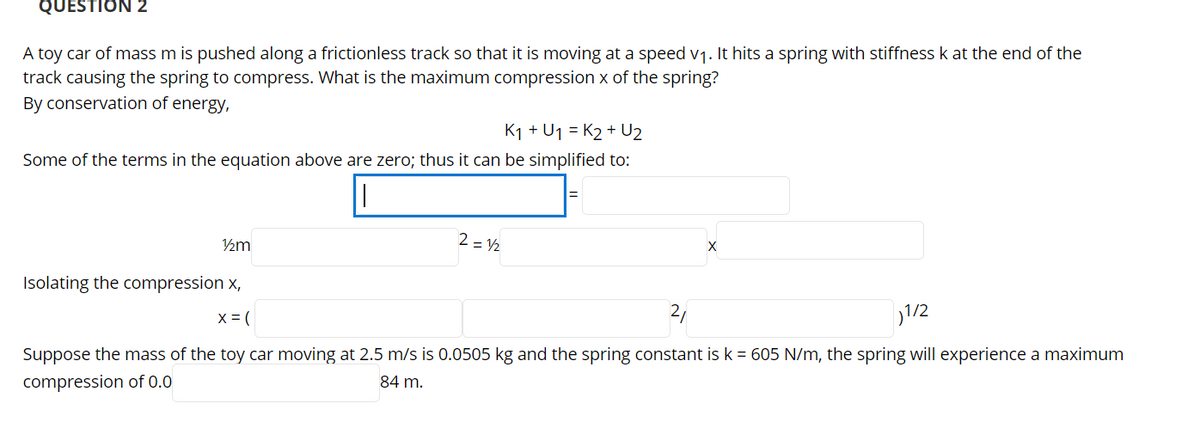A toy car of mass m is pushed along a frictionless track so that it is moving at a speed v1. It hits a spring with stiffness k at the end of the track causing the spring to compress. What is the maximum compression x of the spring? By conservation of energy, K1 + U1 = K2 + U2 Some of the terms in the equation above are zero; thus it can be simplified to: ½m 2 = ½ Isolating the compression x, x = ( 2, 1/2 Suppose the mass of the toy car moving at 2.5 m/s is 0.0505 kg and the spring constant isk= 605 N/m, the spring will experience a maximum compression of 0.0 84 m.
A toy car of mass m is pushed along a frictionless track so that it is moving at a speed v1. It hits a spring with stiffness k at the end of the track causing the spring to compress. What is the maximum compression x of the spring? By conservation of energy, K1 + U1 = K2 + U2 Some of the terms in the equation above are zero; thus it can be simplified to: ½m 2 = ½ Isolating the compression x, x = ( 2, 1/2 Suppose the mass of the toy car moving at 2.5 m/s is 0.0505 kg and the spring constant isk= 605 N/m, the spring will experience a maximum compression of 0.0 84 m.
Physics for Scientists and Engineers with Modern Physics
10th Edition
ISBN:9781337553292
Author:Raymond A. Serway, John W. Jewett
Publisher:Raymond A. Serway, John W. Jewett
Chapter7: Energy Of A System
Section: Chapter Questions
Problem 50CP: A particle of mass m = 1.18 kg is attached between two identical springs on a frictionless,...
Related questions
Question

Transcribed Image Text:QUESTION 2
A toy car of mass m is pushed along a frictionless track so that it is moving at a speed v1. It hits a spring with stiffness k at the end of the
track causing the spring to compress. What is the maximum compression x of the spring?
By conservation of energy,
K1 + U1 = K2 + U2
Some of the terms in the equation above are zero; thus it can be simplified to:
2 = 2
Isolating the compression x,
X = (
21
)1/2
Suppose the mass of the toy car moving at 2.5 m/s is 0.0505 kg and the spring constant is k = 605 N/m, the spring will experience a maximum
compression of 0.0
84 m.
Expert Solution
This question has been solved!
Explore an expertly crafted, step-by-step solution for a thorough understanding of key concepts.
This is a popular solution!
Trending now
This is a popular solution!
Step by step
Solved in 3 steps

Knowledge Booster
Learn more about
Need a deep-dive on the concept behind this application? Look no further. Learn more about this topic, physics and related others by exploring similar questions and additional content below.Recommended textbooks for you

Physics for Scientists and Engineers with Modern …
Physics
ISBN:
9781337553292
Author:
Raymond A. Serway, John W. Jewett
Publisher:
Cengage Learning

Physics for Scientists and Engineers
Physics
ISBN:
9781337553278
Author:
Raymond A. Serway, John W. Jewett
Publisher:
Cengage Learning

College Physics
Physics
ISBN:
9781305952300
Author:
Raymond A. Serway, Chris Vuille
Publisher:
Cengage Learning

Physics for Scientists and Engineers with Modern …
Physics
ISBN:
9781337553292
Author:
Raymond A. Serway, John W. Jewett
Publisher:
Cengage Learning

Physics for Scientists and Engineers
Physics
ISBN:
9781337553278
Author:
Raymond A. Serway, John W. Jewett
Publisher:
Cengage Learning

College Physics
Physics
ISBN:
9781305952300
Author:
Raymond A. Serway, Chris Vuille
Publisher:
Cengage Learning

College Physics
Physics
ISBN:
9781285737027
Author:
Raymond A. Serway, Chris Vuille
Publisher:
Cengage Learning

Principles of Physics: A Calculus-Based Text
Physics
ISBN:
9781133104261
Author:
Raymond A. Serway, John W. Jewett
Publisher:
Cengage Learning

Physics for Scientists and Engineers: Foundations…
Physics
ISBN:
9781133939146
Author:
Katz, Debora M.
Publisher:
Cengage Learning